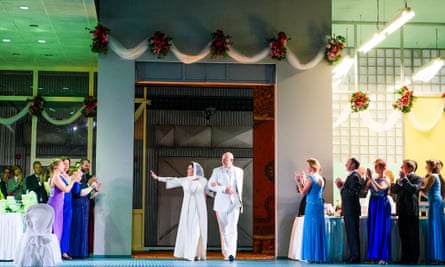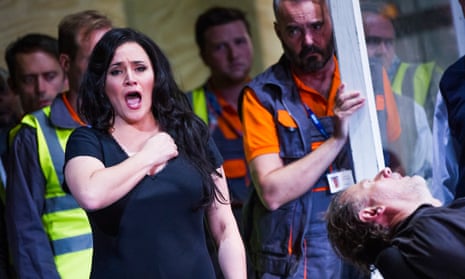It was English National Opera that finally brought the original, unbowdlerised version of Shostakovich’s opera to the British stage, more than half a century after its controversial premiere. David Pountney’s staging of Lady Macbeth of Mtsensk, first seen in 1987, was one of the great achievements of ENO’s “powerhouse years”. It was last seen at the Coliseum in 2001, when it was conducted by Mark Wigglesworth, and Wigglesworth has chosen to open his first season as ENO’s music director by conducting a new production, which is directed by Dmitri Tcherniakov.
Appropriately enough, it’s Wigglesworth’s performance, and those he inspires from the company’s chorus, orchestra and soloists that are so memorable in the new show. He understands completely the musical world that Shostakovich had created for himself in the early 1930s, with its mix of expressionist dissonance and sardonic neoclassicism, its savage contrasts between rampant excess and yawning emptiness, and charges it with irresistible energy. Whether it’s in the monumental climaxes, with the brass bands weighing in from the boxes to either side of the Coliseum pit, or the brilliantly played gallops that give a manic brittleness to so much of the action, there’s a tremendous theatricality to the orchestral playing, which carries over into the wonderfully secure and vivid choral set pieces. Wigglesworth leaves no doubt as to just how extraordinary so much of the score is, and how seditious it, and the subject matter of the opera itself, must have seemed to Stalin and the Soviet hierarchy in 1936.
Yet dramatically Lady Macbeth remains problematic, and getting the right on-stage balance between the blackest of black comedies, which so much of the music suggests, and the stark tragedy that underpins it all and unmistakably overwhelms the final scene is a challenge for any production. At Covent Garden a decade ago Richard Jones went too far down the flippant route, and Tcherniakov’s production, first seen in Dusseldorf in 2008 but reworked for ENO, seems to me to go too far in the other direction.
The action is updated from the mid-19th century of Leskov’s source short story to the present day. The business that Katerina’s monstrous father-in-law Boris Timofeyevich and his weak son Zinovy manage so tyrannically is one of computerised offices and fork-lift trucks, though Tcherniakov’s set also gives Katerina a space of her own that harks back to the world of the original, in which she is walled in by oriental rugs and in which she dresses in traditional clothes. Even in this hi-tech, modern Russia, it suggests, attitudes to women are little different from what they were a century and a half ago.

Tcherniakov doesn’t flinch from the brutality that underpins this industrial and domestic regime, and presents the whole opera as an almost mitigated journey into self-destruction. But, for all its carefully presented detail, that becomes a reductive way of viewing the opera, which also deprives the last scene – set on the road to a Siberian prison camp in the original, contained within a filthy cell in this production – of its gut-wrenching contrast between the unadorned bleakness of the ending and the cartoonish character of what precedes it .
Perhaps because of this, the protagonists, too, aren’t always as crisply defined as they might be. Patricia Racette charts Katerina’s transformation from bored, resentful chattel to emancipated woman with steely control, and unswerving musical authority; John Daszak sings magnificently but is almost too likable as Sergei, the worker who proves her sexual liberator and finally her downfall, while Robert Hayward catches Boris’s brutal, scowling misogyny to perfection.
Whatever the dramatic doubts, though, it’s a magnificent company achievement.

Comments (…)
Sign in or create your Guardian account to join the discussion